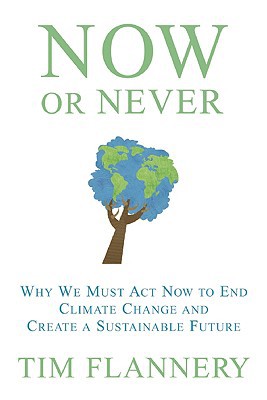

| NOW OR NEVER Why We Must Act Now to End Climate Change and Create a Sustainable Future Tim Flannery David Suzuki (Fwd.) New York: Atlantic Monthly Press, 2009 |
Rating: 5.0 High |
|||
| ISBN-13 978-0-8021-1898-1 | ||||
| ISBN-10 0-8021-1898-4 | 167pp. | HC/SF | $18.00 | |
Tim Flannery is a mammalogist, paleontologist, and global warming activist. He has held several academic posts, and is currently a professor at Macquarie University in Sydney. He is also the chairman of the Copenhagen Climate Council, an international climate change awareness group. He has contributed to over 90 scientific papers and is a prolific author of books and magazine articles. These characteristics of Dr Flannery confer a double benefit on us: that he has both scientific training and an Australian outlook, which is to say a bolder and less conventional outlook than many scientists possess.
In 2005, Tim Flannery released The Weather Makers. It was named Book of the Year at the 2006 New South Wales Premier's Literary Awards.
This book, his latest, was intended to affect world opinion well in advance of the December 2009 COP15 conference in Copenhagen, and before the worldwide events organized by "350.org"1 earlier in that pivotal year. It contains essays on various aspects of the problem. Flannery's topics include the conundrum of how to phase out coal-fired power plants (or sequester their CO2 underground), electric cars and the power grid, and an innovative method of pasturing cattle that preserves both the quality of the soil and of the fodder on which they graze while permitting ranchers to raise larger, healthier herds.
Technical solutions are often derided as "social engineering." The implication of this complaint, as I understand it, is that getting people to change their behavior by exhortation or legislation is a better way to go. Perhaps; but it is not a practical way, for people resist changing their behavior on command. Getting the world to cut carbon emissions is a prime example. Many think it will require painful sacrifice. Some claim it would end civilized life as we know it.
Tim Flannery knows better, because he is a system thinker. Look at this example, a partial description of the elegant method of pasturing cattle devised by Allan Savory, described in Chapter 8.
"The result of this practice is that the weeds as well as the best pasture grass on the property are eaten, and as the plants regrow in the dung-enriched soils, those that put less energy into chemical defenses (which make them unpalatable) are able to colonize the greatest area. These species, lacking chemical defenses, are of course the sweetest feed for cattle, so in a single blow the battle against the weeds is won." – Page 87 |
This is no less a technical solution because it employs no computers, telephones, or electricity. Like many other possibilities which can be found if looked for, it preserves the environment while saving those who practice it money.
"If the fate of their industry depends on investments in new technology, why, you might ask, are the coal companies waiting for government agencies (such as the U.S. Department of Energy) to foot the bill for clean coal? After all, the price of thermal coal (the kind of coal used in power plants) doubled in 2008 to about $112 per metric ton (from its cost of $56 per metric ton in early 2008.) Coking coal (which is used in steelmaking) was doing even better; its price was $300 per metric ton, up from $97 a year before. Prices have since fallen sharply, but with such windfall profits accruing to the industry, surely there's plenty of latitude for investment in technologies that offer its only lifeline to the future." – Page 51 |
This is one case where being an Aussie is a disadvantage. As an American, I know why no coal baron willingly invests in future technologies: his company's profit margin would decline (even if only marginally) and after several quarters when the company was surpassed in this return by its competitors, the board of directors would turn him out.
Dr. Flannery's series of essays ends on page 107. After that there are three pages of notes. These are followed by responses from Bill McKibben, Richard Branson, Peter Singer, Fred Krupp and Peter Goldmark, Gwynne Dyer, Alanna Mitchell. Finally, Tim Flannery replies to these commentaries on his work. This book thus constitutes an extended dialog by very well-informed people with diverse viewpoints. It is definitely worth reading. It probably is not a keeper, though, but more likely one you'll want to pass along to a friend, or donate to a local library, as a thought-provoker. At that, it succeeds admirably.

 To contact Chris Winter, send email to this address.
To contact Chris Winter, send email to this address.